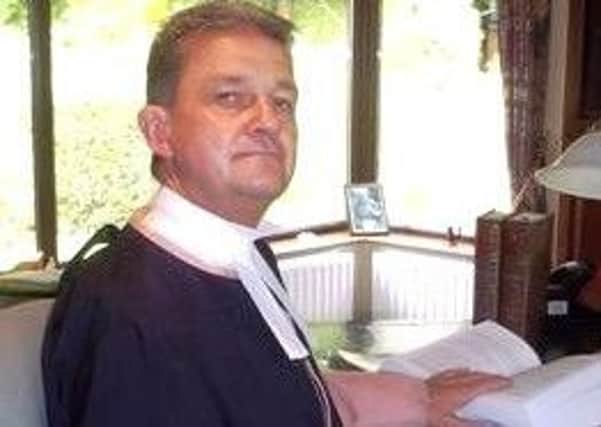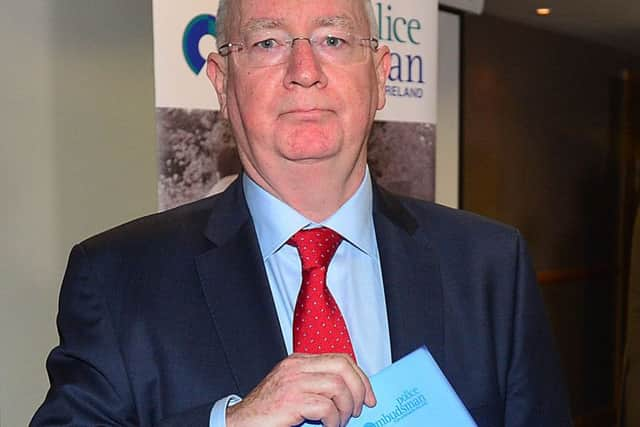Ben Lowry: Judge standing aside in Loughinisland case was an astonishing decision


Before Christmas, Mr Justice McCloskey issued a scathing verdict on the 2016 Police Ombudsman report on the 1994 massacre at a pub in Loughinisland, Co Down. That report had found collusion between the RUC and the loyalist culprits.
The 2016 Ombudsman report was then challenged by two retired senior detectives, Raymond White and Thomas Hawthorne.
Advertisement
Hide AdAdvertisement
Hide AdSince Mr Justice McCloskey’s initial ruling on the detectives’ legal action, lawyers acting for relatives of the victims and the Ombudsman have sought to overturn his judgement.


They alleged subconscious bias on the part of Mr McCloskey, because he had once represented police officers in circumstances with similar facts.
Eight days ago, on Friday January 19, there were robust exchanges between Mr Justice McCloskey and Barra McGrory, the former Director of Public Prosecutions, representing the Ombudsman, on the merits of this bid to get Mr McCloskey to recuse himself.
Yesterday, the judge explained emphatically why he thought the challenge had no merit. Yet he then recused himself anyway, to spare the sensitivities and ensure the trust of the relatives of the dead.
Advertisement
Hide AdAdvertisement
Hide AdMr Justice McCloskey is a respected legal figure with a reputation for being thorough and independent-minded.


His decision to have the case re-heard was swiftly welcomed by the families, the SDLP, Sinn Fein (who had at least three elected representatives at court), and by pressure groups such as the Pat Finucane Centre and Relatives for Justice.
But when I read and re-read the judgement yesterday, which is on this website in full (click here to read it) and think of the points made in court on January 19, it seems to me to demolish the case for recusal, I find it hard to see why it is being granted. (See below some withering excerpts about the Ombudsman in the judgment).
During the arguments for recusal, overwhelming case precedents were cited to illustrate the presumption of judicial impartiality.
Advertisement
Hide AdAdvertisement
Hide AdTo illustrate of the range of his previous judgements, Mr Justice McCloskey cited a previous case in which he had issued such a damning judgment against the police that policing practice had been urgently changed on the back of his findings.
Lawyers for the families and Ombudsman on January 19 cited in oral arguments the exceptional nature of the Loughinisland massacre and the publicity around it.
But that sounded rather like someone playing an emotional trump card in a debate: ‘Because this was evil and high profile, special circumstances apply.’
In his judgement yesterday, Mr Justice McCloskey comprehensively rejected arguments that the test for apparent bias had been reached.
Advertisement
Hide AdAdvertisement
Hide AdThen the whole tenor of his ruling changed. He said: “In undertaking this exercise I find myself focusing increasingly on the situation of the families of the murdered victims. They have found themselves actively involved in the Northern Ireland legal system during much of the past six years ... The families have become engulfed in a veritable maelstrom.”
He added: “In these circumstances, I consider it necessary to reflect on the question of whether the families can have genuine confidence in the outcome which would follow if the court were to give effect to its judgment and choice of remedy by the usual medium of a formal final order ...
“Following anxious reflection, my evaluative conclusion is that our legal system will not have served the families well if they are not given the opportunity of having this case heard by a differently constituted court.”
It was an astonishing outcome.
The judge had also said he was minded to expunge parts of the 2016 report, rather than the “nuclear option of quashing the report in its entirety.” Such a finding was overtaken by him stepping aside.
Advertisement
Hide AdAdvertisement
Hide AdIt is worth recalling that the 2011 report of the previous Police Ombudsman, Al Hutchinson, into Loughinisland was quashed (that report did not find collusion).
There was no uproar when that happened. You can only imagine the uproar there would have been had the later report (that did find collusion) been quashed.
There is an army of victims’ families in Northern Ireland quietly waiting for justice. There is an array of unsolved terrorist massacres.
Republicans, indeed nationalists, are making relentless noise about a certain category of victims (of state or loyalist violence).
Advertisement
Hide AdAdvertisement
Hide AdSuch politicians spray accusations of bias, high and low. They react with fury when a finding is not to their liking, such the original Loughinisland report.
We must have confidence that, amid such pressure, the authorities will take hard decisions on the facts.
I spent much of yesterday afternoon on the phone to politicians and advisors who take an interest in legacy. One of them, the Ulster Unionist councillor Jeff Dudgeon, told me: “This is so serious it requires all talks, discussion and decision making about legacy to be put on hold.”
He is not the only person to be thinking that way.
SEE BELOW SCATHING EXCERPTS FROM RULING
• Ben Lowry (@BenLowry2) is News Letter deputy editor
EXCERPTS FROM JUDGEMENT:
Advertisement
Hide AdAdvertisement
Hide Ad“The suggestion that the information available to the Ombudsman on 14 December 2017 was insufficient to mount a recusal application is in my judgement manifestly unsustainable. The basic, essential facts were known to him as of then. In an attempt to circumvent this hurdle, an elaborate construct has been placed before the court. Its centrepiece is an affidavit sworn by the Ombudsman’s Director of Legal Services purporting to depose to the Ombudsman’s state of mind and knowledge.
The Ombudsman has sworn no affidavit. The impropriety involved in the lawyer’s affidavit is unmistakable.”
...
“Having regard to the totality of the evidence, the communications between the Ombudsman’s former senior counsel and senior counsel for the Applicants before the hearing began are a paradigm red herring. The Ombudsman was advised immediately after the hearing that there were no grounds for a recusal application and accepted such advice. He would inevitably have been given the same advice
before the hearing began. It is inconceivable that he would not have accepted such advice: the events of 14/15 December 2017 and 08 January 2018 establish this fact beyond peradventure. 14/15 December 2017 and 08 January 2018 establish this fact
Advertisement
Hide AdAdvertisement
Hide Adbeyond peradventure. The submissions of Mr McGrory QC on this discrete issue resolve to a desperate attempt to airbrush this unassailable reality.”
...
“To summarise, I find the evidence and argument put forward on behalf of the Ombudsman pertaining to the aforementioned issue flimsy, artificial and entirely unpersuasive. To all of the facts and considerations identified and highlighted above, one adds the
unequivocal statement in the most authoritative and comprehensive guidance on this subject, the decision of the English Court of Appeal in Locabail, that the acceptance of instructions to act for or against a party or legal representative in a
previous case will not normally warrant disqualification in the instant case. This is a mirror image of the official guidance to all members of the judiciary, contained in the Statement of Ethics for The Judiciary in Northern Ireland. I consider it likely that
Advertisement
Hide AdAdvertisement
Hide Adthe independent observer, while of course maintaining an open and circumspect mind, would attribute weight to this. The notional briefing of the observer would also highlight that these are public law proceedings involving no lis inter-partes. The
observer would further be aware that the substantive judgment of this court has not entailed any evaluation of conflicting evidence, oral or documentary, any credibility assessments of witnesses or the making of factual findings on contentious issues.”